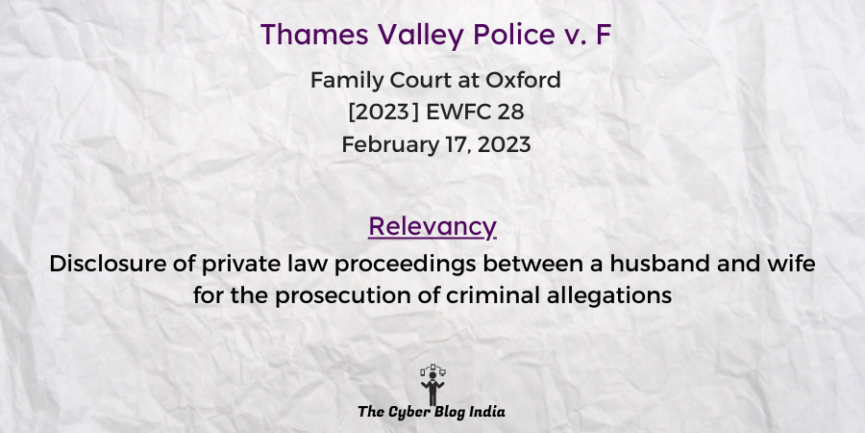Thames Valley Police v. F

Thames Valley Police v. F
[2023] EWFC 28
In the Family Court at Oxford
Before Justice J. Vincent
Decided on February 17, 2023
Relevancy of the case: Disclosure of private law proceedings between a husband and wife for the prosecution of criminal allegations
Statutes and Provisions Involved
- The Children Act 1989 (Section 7, 98)
- The Family Procedure Rules 2010 (Rule 12)
Relevant Facts of the Case
- F, the wife, and G, the husband, married in 2011 and separated in 2021. In one incident, he assaulted her. A CCTV camera captured this incident. They eventually divorced.
- The Family court issued orders preventing the father, G, from having contact with the children due to his abusive behaviour. It also issued a non-molestation order against him based on threats the mother, F, recorded.
- The Thames Valley Police applied to disclose documents from private law proceedings between F and G to assist in a criminal investigation.
- They aimed the application to assist the Crown Prosecution Service (CPS) in deciding whether to charge G for threats to kill and F for stalking and computer misuse.
Prominent Arguments by the Counsels
- The applicant’s counsel argued that they made the application to assist the CPS in understanding F’s mitigation and the level of risk posed by G. The counsel cited the Family Procedure Rule 12.73, asserting themselves as professionals acting to further protect children. Further, they referenced the Re EC checklist for disclosure factors.
- The respondent’s counsel submitted that the police’s application was unfounded due to a lack of supporting evidence. The counsel emphasised that the police had sufficient information from other sources, including MARAC meetings and existing court orders. Further, the counsel reiterated that F had already admitted to making the recordings and providing them to the police.
Opinion of the Bench
- The police’s request lacked detailed information about their investigation. They failed to prove the relevance of the requested documents. Furthermore, they needed to fill gaps in their knowledge.
- It highlighted the potential negative impact on the welfare of the children if confidential family court material were disclosed.
- The court criticised the police for failing to engage in meaningful dialogue with F and her solicitors before the hearing.
Final Decision
- The bench refused the application and ordered the police to pay F’s legal representation costs, which amounted to £6,600, including VAT.
